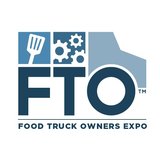Article
Barbecue restaurant veteran finds new life on a food trailer, learns through trial and error
Former brick and mortar restaurateur Doug English needed to make a career change on account of his life's circumstances. A barbecue food trailer was a natural choice, but he had to learn much about the business through trial and error. Several months later, he's glad he made the move.

April 6, 2017 by Elliot Maras — Editor, Kiosk Marketplace & Vending Times
Doug English, owner of DJ's Catering and Concession, loves to barbecue. His passion for preparing barbecue ribs and chicken-fried steak gave him the inspiration to learn how to run a restaurant after working 20 years as a farrier (someone who shoes horses.)
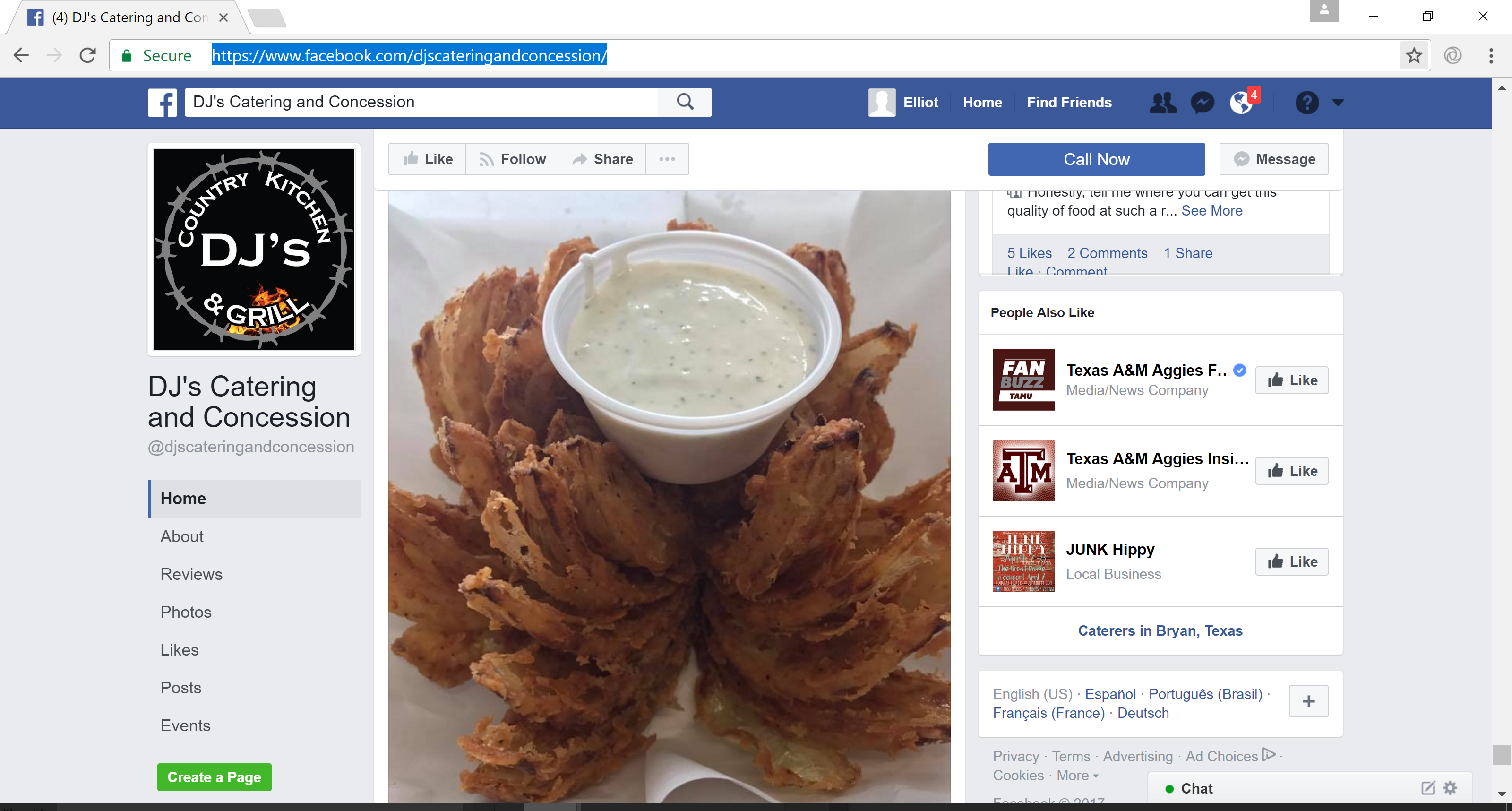 |
Doug English features specials on his Facebook page. |
Although he once ran a successful brick-and-mortar restaurant in Checotah, Oklahoma, he left the business behind following a divorce.
He returned to his hometown, Bryan, Texas, where he remarried and focused on building his next career.
"I didn't want to get back into the restaurant business," he said. "I knew that, but I like to cook. I didn’t want to be locked down every day to the same place. The main thing I like to do is catering, because you know how much you’re going to make before you start."
Trailers offer opportunity
English had seen mobile food trailers and liked the idea of driving around to serve his favorite barbecue dishes at fairs and festivals.
He reasoned that a food trailer would give him the chance to cook his favorite foods without being constrained to one location and give him plenty of opportunity to cater. He knew he could rely on his wife, Jessica, to handle the bookkeeping and accounting. So he decided to give it a go.
English knew he needed a smoker and a steak grill to prepare his barbecue fare. He needed a trailer with enough room for a kitchen and a smoke pit.
He searched for trailer builders on the internet and spoke to five or six companies before settling on Southern Dimensions in Waycross, Georgia, which specializes in barbecue trailers.
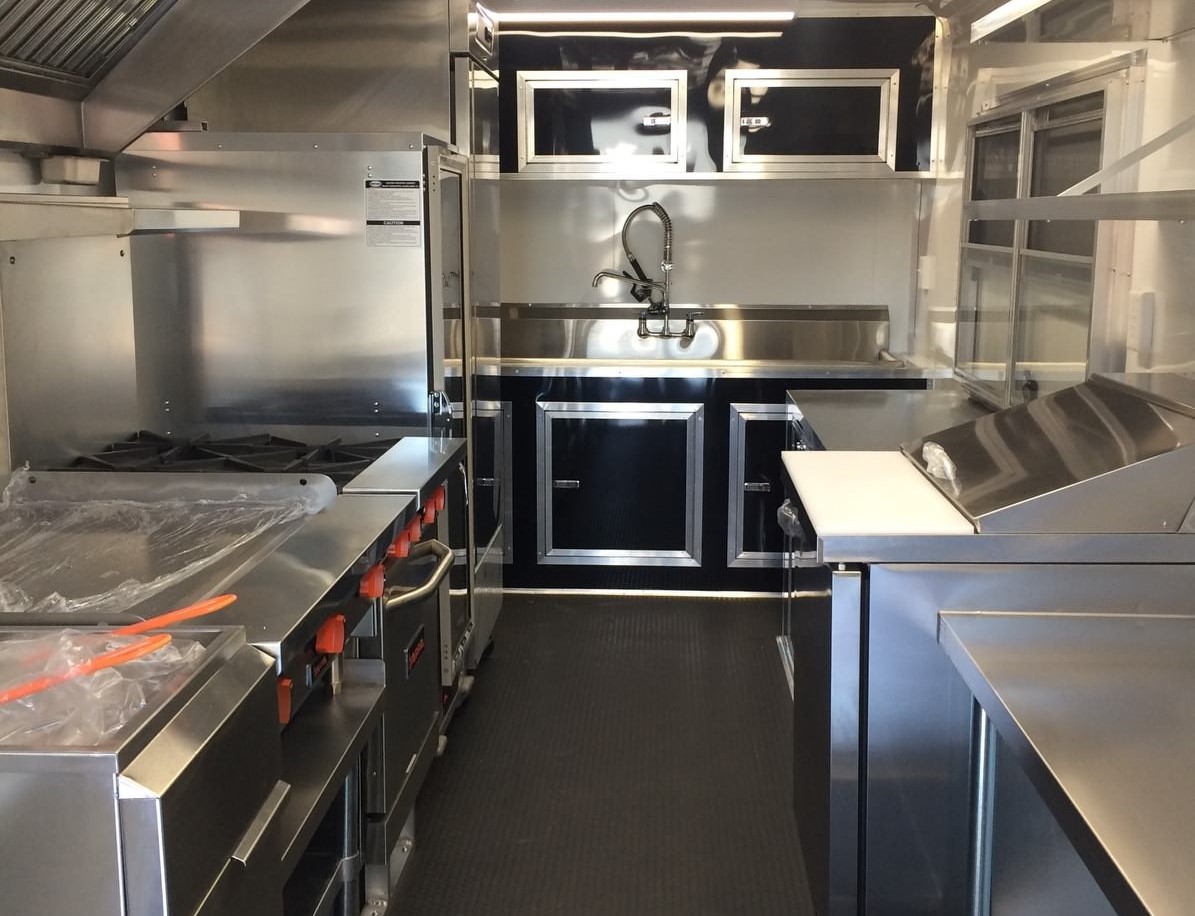 |
The trailer contains a complete kitchen. |
"He (Southern Dimensions salesman Troy Bowling) had a lot of good ideas to help me," English said.
He spent nearly eight months designing his 8.5- by 26-foot food trailer.
"I just kind of kept thinking about what to put in there, different kinds of equipment and how to get it in there," English said. "You've only got limited space. You want to compact it down as tight as you can."
He wrote up specs for more food equipment than he had ever seen on a trailer. It has a 84-inch smoker on the back, a 2- by 4-foot steak grill on the side, a screened-in, 8-foot porch and a full kitchen with fryers, griddle, warm box, oven, stove, prep table and refrigerator.
Southern Dimensions ordered the equipment and built the trailer to English’s specs. They checked with his health department to make sure the trailer complied with the health code.
"It's got everything a commercial kitchen has," English said with pride. "The unit I have can cook any food from smoked meats to grilling to a full kitchen. It's got anything you want to cook from a hot dog to a filet."
The trailer itself cost $50,000, as did the 2015 diesel Dodge truck he purchased to pull the trailer. The cooking and prep equipment totaled $40,000.
Ready to roll
DJ's Catering and Concession proudly serves chopped brisket and pulled pork with home-made barbecue sauce, jumbo smoked turkey legs, smoked sausage and home-made fried pies.
English uses the same recipes he developed for his brick and mortar restaurant.
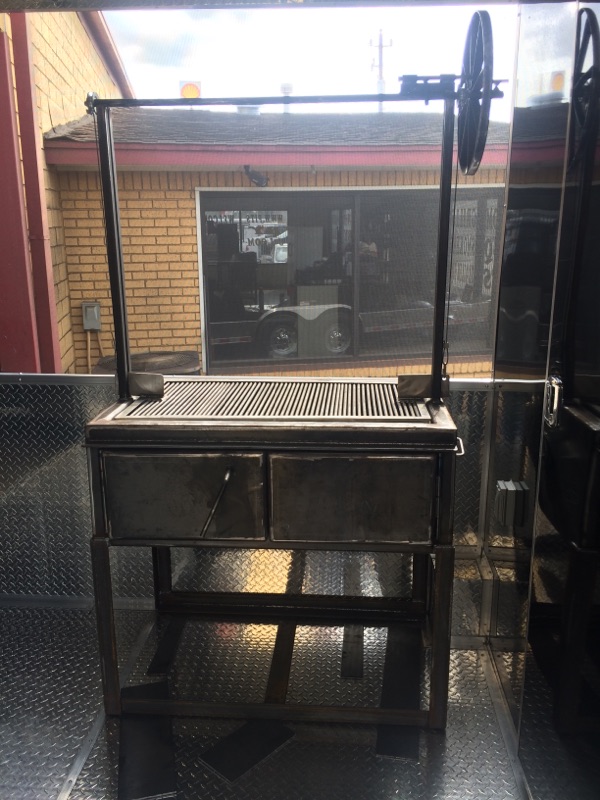 |
The trailer has a grill pit in the rear. |
This past November, English loaded up his trailer with meat from a local butcher, Reffino's, and food he bought at Sam's Warehouse Club.
But his learning journey had only begun.
English’s biggest challenge was two-fold: learning about selling events and knowing which ones to attend.
He learned about events in Houston, Dallas and Fort Worth through word of mouth and from websites like fairsandfestivals.net.
He began attending two- and three-day arts-and-crafts shows drawing 10,000 to 12000 people.
"If everything goes good, you can make about $5,000 to $7,000 (per show) and you’ll have anywhere from $1,500 to $1,800 in expenses," he said.
He posts his daily menu and locations on his Facebook page.
The lunch menu typically has four items: hamburgers and cheeseburgers; chicken fried steak sandwiches; a barbecue item; and a daily special.
Customers can pay with cash and with credit cards using Square; about half the customers pay with cash.
Rising to challenges
"It's a hard job," English said. "There isn't anything easy about it."
One of the hardest things is trying to minimize food waste.
"Food waste is probably the biggest thing that will sink a company," said English, who loses about $20 a week to waste.
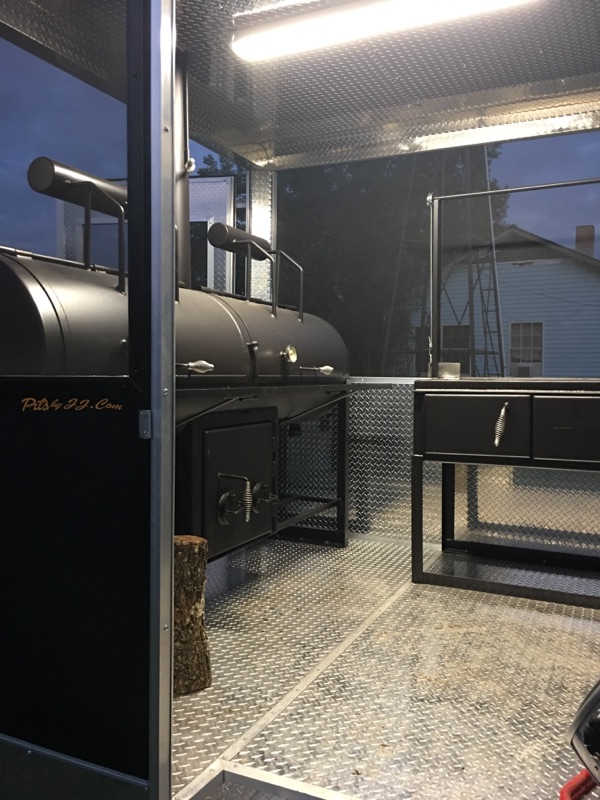 |
English wrote specs for a smoker in the trailer. |
"The hardest thing in the restaurant business is to keep good quality food, but keep it fresh," he said.
The fairs often charge vehicles in plots of 10, 20 and 30 feet of space. Fortunately, some of the organizers are flexible.
"A lot of them allow me to go ahead and buy 20-foot space," he said.
Another challenge is finding out which events are the best to attend. This has been a process of trial and error.
"Experience is the only way you keep from losing your hind end," English said. "You've got to have enough food to make some money, but if you have so much food that you don’t sell it, then you lose."
"If you're not making $5,000 or $6,000, it’s not worth going to them because of the time you’ve put in getting ready for them."
In addition to the events, English parks his trailer near an industrial park and a main road. He is open from 6 a.m. to 2 p.m., Monday through Friday. He typically clears $500 per day.
What's next?
English has his sights set on county fairs, which are larger than the other events he has attended. The county fairs typically last five to seven days, serving 10 to 15 hours per day.
"A lot of those big fairs, you’ll be out of pocket three grand before you even start the show," he said. "And if you don’t do very good, you’ve bombed."
The big the state fairs, which can last as long as 18 days, are at least a year away for him, however. For these events, he will need a crew of 10 people. He currently runs his truck with the help of his wife and his sister.
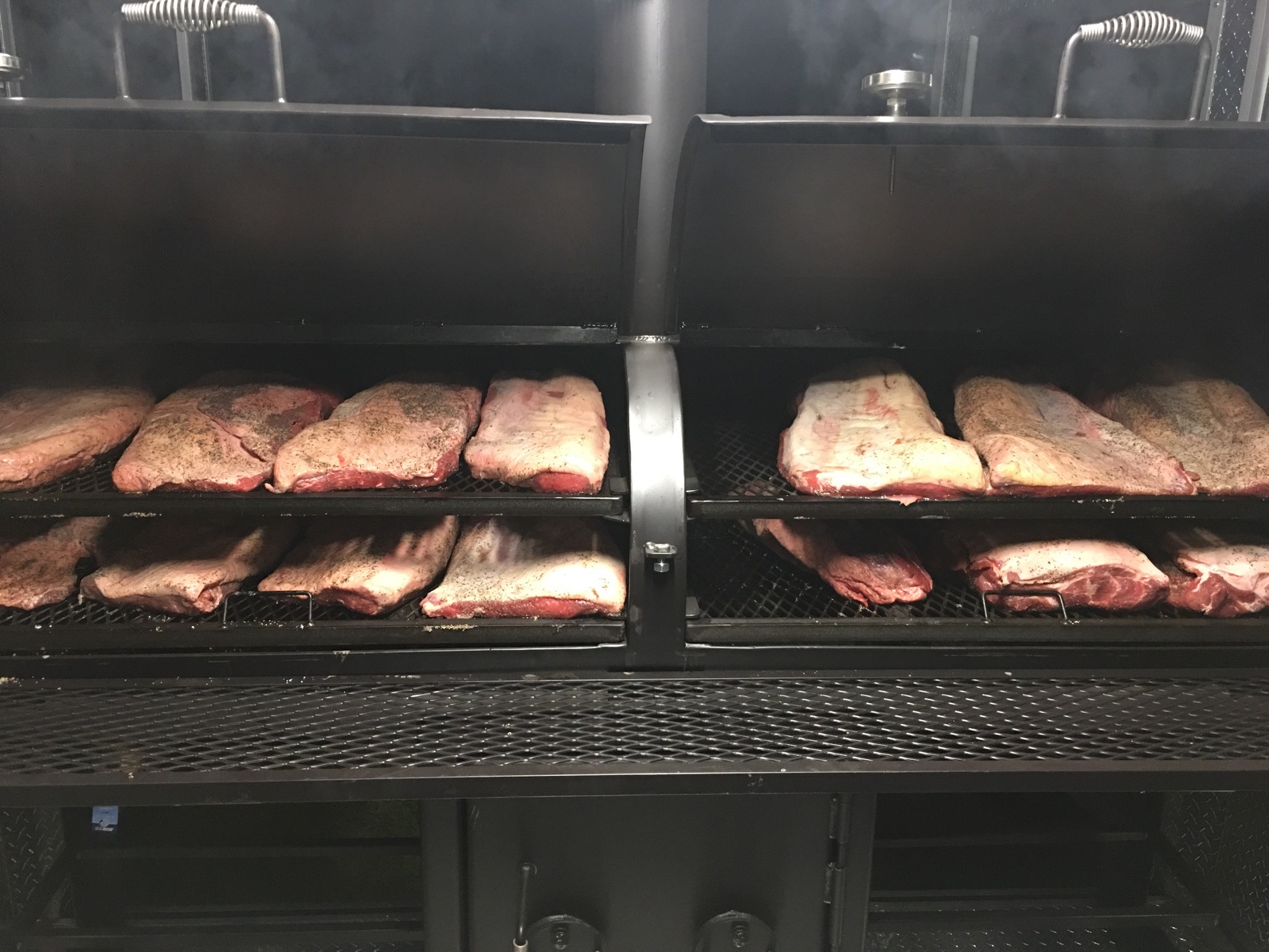 |
Barbecue pork grills in the trailer. |
“I haven't really figured that one out yet," English said. "You have to get into those a year in advance. There's a lot of red tape to get into those. They want people with experience. They want to know what your menus is. Some of them ask for your W-2s."
Based on input from other mobile food vendors, English believes state fairs can bring $70,000 to $90,000 in sales.
He estimates that stocking up and hiring the necessary labor will run $25,000, plus commissions and entrance fees.
One food truck operator told him he made $30,000 in profit on $90,000 in sales for a big show.
Outlook hopeful
"There are a lot of people going to these food trucks," he said, noting that the business is getting more competitive. He expects more to launch in the next two to three years.
Meanwhile, he thinks he made the right decision switching from a brick- and-mortar restaurant to a food trailer.
"You can make six figures if you get in the right spots," he said.
About Elliot Maras
Elliot Maras is the editor of Kiosk Marketplace and Vending Times. He brings three decades covering unattended retail and commercial foodservice.






